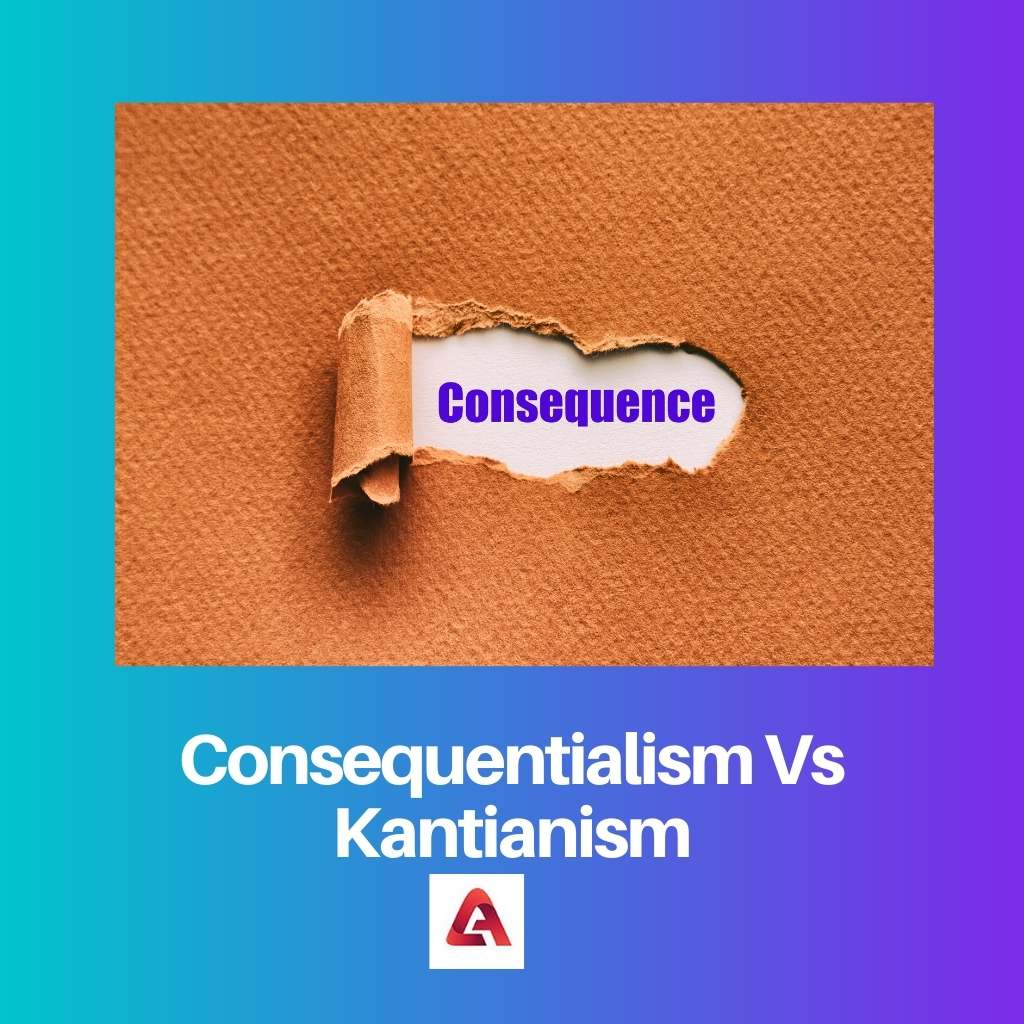Some utilitarians are consequentialists (such as David Cummiskey and Richard M. Hare) who recognize a certain connection between Consequentialism and Kantianism in general, although many are neo-Kantians.
Some personalities like Wick or Christine M. Korsgaard reject such reasoning.
Other neo-Kantians, who acknowledge this element of Kant’s ethics, attempted to mitigate the impracticability of Kant’s ethical conceptions and eliminate criticism for Kant’s lack of interest in real-world moral problems.
To know how these theories are applied in day-to-day activities, read along.
Key Takeaways
- Consequentialism focuses on the outcomes of actions to determine their moral value, while Kantianism emphasizes the inherent moral duty in acting.
- Consequentialism allows for moral flexibility, whereas Kantianism adheres to strict moral rules.
- Utilitarianism is a popular form of consequentialism, while the categorical imperative is a central concept in Kantian ethics.
Consequentialism Vs Kantianism
Consequentialism and Kantianism differ because Consequentialism holds that normal characteristics are solely determined by their consequences, as the name implies. Kant’s ethical philosophy is based on responsibility ethics, meaning that people must follow the moral code.

Consequentialism states that an action is correct in specific circumstances if it produces the best outcome out of all the options available.
The fact that consequentialism is unconcerned about how consequences are produced is one of its main characteristics. What matters when deciding what to do is the outcome of one’s different options, not the options themselves.
Only moral activity is connected with professional ethics and performed together with moral aims, as per Kantianism.
Even though utilitarianism and Kant have different perspectives on the role and motivations of rules for assessing moral or right behaviour, they can be regarded as formal equivalent approaches because they both establish precise formal criteria for determining moral or right action.
Comparison Table
| Parameters of Comparison | Consequentialism | Kantianism |
|---|---|---|
| Meaning | In this theory, the actions are concluded either as to be fair or harmful based on people’s repercussions. | This theory is based on consequences not depending on the actions of people. |
| Positives | The theory is logical and encourages people to make decisions based on their happiness. The decision-making process is stress-free, filled with common sense. | This theory is based on universal moral laws, regardless of legal status, culture, or individual situations. The theory is also simple and rational. |
| Negatives | The decisions cannot be finalized without evaluating thoroughly. Such evaluations are time-consuming. | One may try to skip the process to get the result by using this theory.This theory also contrasts the statement that killing animals is unethical. |
| Conflicts | No conflicts. | Gives rise to conflicts. |
| Interpret | Difficult to interpret. | Simple to interpret. |
What is Consequentialism?
In ethics, Consequentialism refers to evaluating the rightness or wrongness of a course of action in terms of its (actual and/or likely) consequences; a traditional utilitarian view would be that the right course of action maximizes beneficial outcomes.
In moral philosophy, Consequentialism is the belief that an action’s rightness is completely determined by its consequences.
Consequentialism encompasses a variety of ethical viewpoints, including utilitarianism, which holds that an action’s rightness is completely determined by the quantity of utility (measured as happiness, pleasure, and so on) it generates.
When faced with a problem, a consequentialist would weigh the pros and cons of each option and choose the one that provides the most benefit while causing the least harm.
To almost all of these criticisms, the consequentialist response is that negative consequences are being overlooked.
They aren’t always easy to locate, but they are always present. If we can’t uncover any negative consequences but still have a gut feeling that something is ethically wrong, the consequentialist approach will be to question the legitimacy of our intuitions.
The most well-known example is consequentialism on the morality of acts, which believes that either an act is morally right is solely determined by its effects or anything related to it, such as the motivation for the act or a basic rule that includes action.

What is Kantianism?
Immanuel Kant, a philosopher, developed the philosophy of Kantianism.
The Categorical Imperative, according to Kant, is where morality comes from.
The objective is to come up with a system of rules that, if followed by everyone in society, would make everything work.
Regardless of whether or not everyone else is following the rules, you must follow them.
Should we, for example, lie or tell the truth when communicating? The fundamental purpose of communication would be nullified if everyone lied.
But it would not be if everyone always stated the truth. As a result, Kant’s philosophy holds that you should always tell the truth, even if others don’t.
In contrast to consequentialist theories, Kant’s philosophy holds that their consequences determine the morality of actions.
In a consequentialist framework, we might claim that deceiving Natzis to keep them from locating Jews is good. However, lying to steal money from elderly folks is unethical.
Both are evil in Kant’s philosophy.
You cannot justify breaching one of the categorical imperative’s norms simply because it appears that doing so would result in a better end in a specific case.
Main Differences Between Consequentialism and Kantianism
- In Consequentialism, good consequences lead to good acts and vice versa. In contrast, this in Kantianism leads a bad act to a good consequence.
- The ethics in Consequentialism is based on how people should ultimately do what makes them happy. The ethics in Kantianism is based on bare emotions.
- Acts in consequentialism may lead and support the criminal justice for the offenders, whereas, in Kantianism, it doesn’t lead or support the criminal justice for the offenders.
- Consequentialism is a violation of human rights. Human rules are respected in Kantianism.
- The decisions in Consequentialism require a high-complexity process. In contrast, Kantianism involves a simple process.
- https://www.journals.uchicago.edu/doi/pdf/10.1086/293212
- https://www.pdcnet.org/jpr/content/jpr_2002_0027_0537_0551
- https://www.jstor.org/stable/40658411

Very clear explanation of the differences between Consequentialism and Kantianism
Agreed, the comparison table provides a clear picture
Good overview of consequentialism and Kantianism, the explanation is easy to understand
I believe the piece could delve deeper into some real-world examples
I agree, Tim. A deep analysis of those two ethical theories
Great insights into Consequentialism and Kantianism
Informative and well-written, the differences are well articulated
The key takeaways are helpful in understanding the essence of each theory
I would like to see more discussion on the application of each theory in the real world
Interesting breakdown of these philosophical theories, further examples would be beneficial
Great work in laying out the fundamentals of Consequentialism and Kantianism
Insightful and comprehensive analysis of Consequentialism and Kantianism
I agree, Summer. It provides a good basis for understanding these theories
A well-structured piece, would appreciate more on challenges and criticisms of both theories
Clear and concise overview of Consequentialism and Kantianism